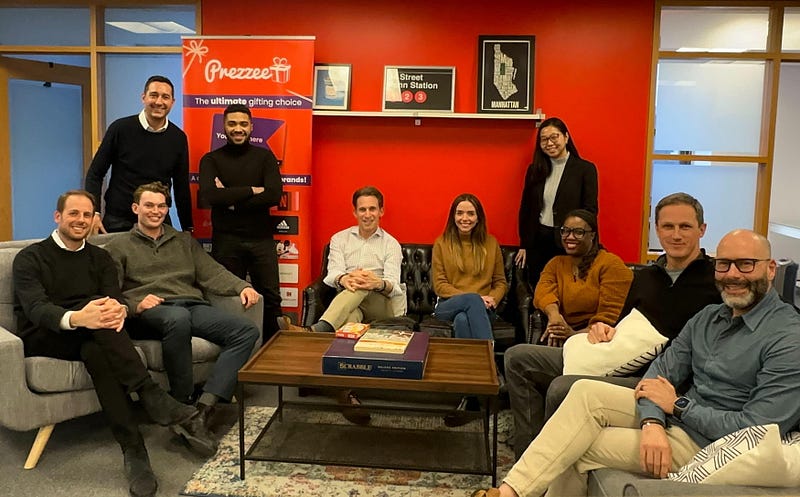Gratitude: Make it a priority to regularly express gratitude for actions both big and small. Taking the time to say ‘thank you’ and follow up has had a profound impact on the morale of my team.
We are living in the Renaissance of Work. Just like great artists know that an empty canvas can become anything, great leaders know that an entire organization — and the people inside it — can become anything, too. Master Artists and Mastering the Art of Leadership draw from the same source: creation. In this series, we’ll meet masters who are creating the future of work and painting a portrait of lasting leadership. As part of this series, we had the pleasure of interviewing Josh Berwitz.
Josh Berwitz, Prezzee’s North America President and Chief Growth Officer, has nearly 25 years of experience in the financial services industry and is responsible for ensuring Prezzee achieves its growth ambitions and secures its position as the leading digital gifting company in North America.
Thank you for joining us. Our readers would enjoy discovering something interesting about you. What are you in the middle of right now that you’re excited about personally or professionally?
I’m incredibly excited by my recent move to join the Prezzee executive leadership team. I joined the company in October, moving over from American Express after 24 years. Joining a startup is a huge change for me and I’m really energized by the company’s vision and mission. Everything at Prezzee centers around human connection and human behavior. We say we are about “giving openness, greatness, magic, and most importantly, giving a damn.” Working to grow this business and innovate around our products is energizing to me not only because of “what” we are doing, but because of “how” we are doing things, how we approach business, and the mindset we take as a company.
We all get by with a little help from our friends. Who is the leader that has influenced you the most, and how?
I’m not sure I would specify one leader. I actually believe that you should learn something from everyone you work for in your career. Ultimately, to be a genuine and credible leader you need to lead in your own style and with your own approach. That said, in doing so you can always learn how to be more effective by watching others. I recently worked for an executive at American Express who always emphasized the need to lead with your true self. When I first started I remember her saying to me “you never sit still and you are never in your office and I don’t care”. I remember how liberating that was to hear!
Sometimes our biggest mistakes lead to our biggest discoveries. What’s the biggest mistake you’ve made as a leader, and what did you discover as a result?
I would call out two examples. Earlier in my career, we were moving offices. There were lots of questions about seating and logistics in general. Ultimately I was more dismissive than I should have been, believing this was a “small thing” and the team should focus on larger priorities. What I failed to realize was that people need to feel personally comfortable to thrive professionally. It was a small moment but a big learning.
A second example was a business debate I was having with another leader about an initiative. I felt strongly about my perspective. I spent numerous meetings trying to win over this other leader versus taking the time to understand the rationale behind her view. It took me longer than it should have to understand that not only was I not winning the debate, but I was damaging a relationship. Ultimately this taught me that you don’t win negotiations without understanding and giving credibility to opposing positions.
How has your definition of leadership changed or evolved over time? What does it mean to be a leader now?
Many of us as young leaders get caught up focusing on the “what.” The what is the end-state or the output. It’s incredibly important. But the reality is that the “how” really matters most over time — how you engage with others, how you develop culture, how you recognize employees, how you teach and guide others. Over time, my emphasis on the “how” vs the “what” has become much greater.
With this in mind, and knowing that how you engage your team is critical to the success of your business and business outputs, I’ve developed a few core leadership beliefs:
Allow people to operate within who they are. Your team will be the most engaged, successful, collaborative, and open if people are allowed to bring their true selves to work. Leaders should help people become as successful as possible within who they are not by mimicking your style.
Be as transparent as you can be. I believe that good leaders build confidence and trust through transparency.
Regularly reflect and self-evaluate. I regularly reflect on if I am giving my team what I want from my leaders. Thinking about your leadership approach in this way helps you to address blindspots in how you engage your team.
Gratitude. Consistent and informal gratitude is a key part of my leadership style. Connecting and following up with a thank you, even a very informal one, is incredibly meaningful to employees.
Success is as often as much about what we stop as what we start. What is one legacy leadership behavior you stopped because you discovered it was no longer valuable or relevant?
I have come to understand that legacy leadership styles, like a more autocratic, top-down approach, are rarely effective in today’s business world. Yes, there are rare instances where that approach is needed but the landscape has changed and the workforce today doesn’t work well in that way. Everything is more fluid.
What is one lasting leadership behavior you started or are cultivating because you believe it is valuable or relevant?
Earlier on in my career it was not nearly as common to contemplate, let alone facilitate discussion around mental health and well being into work. Today it is essential and welcomed.
What advice would you offer to other leaders who are stuck in past playbooks and patterns and may be having a hard time letting go of what made them successful in the past?
To me, I think the more autocratic leadership style is really a thing of the past. The top-down approach with very rigid separation between leadership and team members just no longer fits. With technology constantly evolving and the always-on nature of our world paired with the mindset and ideology of employees today, it’s rare that this leadership style is effective. Interestingly, a litmus test I suggest is to think about the way in which you interact personally with people whether that is your immediate family or your network of friends. This changing nature of communication is a great way to inform and understand the shifts taking place at work.
I’m excited to be a part of Prezzee because they put human behavior and connection at the center of everything we do. Because of this, we are always aiming to create a sense of belonging with our employees. I strive daily to lead in a more transformational leadership style as a leader who sets a clear vision and goals, fosters workplace harmony and clear communication, but empowers the team to do the work they believe is best.
Many of our readers can relate to the challenge of leading people for the first time. What advice would you offer to new and emerging leaders?
For all leaders and especially new ones, I believe it is crucial to be self-aware and focus on emotional intelligence just as much as your business goals. This will help to establish a solid foundation of trust and respect within your team.
Additionally, I recommend being adaptable and open-minded. As a new leader, you will likely encounter new challenges and situations that you have not faced before, and it’s important to understand you may make mistakes, but it’s how you evolve for the better from those mistakes that will determine your lasting impact.
Lastly, learn from others but don’t ever forget that the most influential way to lead is by being true to yourself. You cannot generate trust and credibility if you act in a way that is antithetical to your own personality.

Based on your experience or research, what are the top five traits effective leaders exemplify now? Please share a story or an example for each.
In my experience, effective leaders possess a unique blend of traits that allow them to inspire and lead their teams to success. The top five traits that come to mind are:
Transparency: Effective leaders communicate transparently, which helps to build trust and credibility with team members. For example, holding regular team meetings to keep everyone informed about the company’s progress and encouraging team members to share their ideas and feedback.
Self-reflection: Regularly reflect and self-evaluate. I regularly reflect on if I am giving my team what I want from my leaders. Thinking about your leadership approach in this way helps you to address blindspots in how you engage your team.
Gratitude: Make it a priority to regularly express gratitude for actions both big and small. Taking the time to say ‘thank you’ and follow up has had a profound impact on the morale of my team.
Valuing Diversity: Effective leaders recognize the strength in differences, valuing diversity and individuality among team members. For instance, recognizing the unique strengths and talents of each team member and creating opportunities for them to showcase their skills and make meaningful contributions to the team.
Vision: Effective leaders possess a clear vision, which allows leaders to set a direction and guide their team towards a shared goal.
American Basketball Coach John Wooden said, “Make each day your masterpiece.” How do you embody that quote? We welcome a story or example.
Coach John Wooden’s quote “Make each day your masterpiece” resonates with me on a personal level. First of all, we must remember that your “day” isn’t just about work. Your day goes well beyond it and no day can be a masterpiece if you don’t find fulfillment both inside and outside of work.
At work, I try to approach my work with an imaginative spirit and open mind, ready to embrace new opportunities and ideas that the day may uncover. I try to set clear goals and objectives that align with the overall strategy of the company, but I also try to be open to adapt and pivot as necessary. Lastly, it is crucial to laugh and avoid the temptation to take yourself too seriously. You can be incredibly passionate and unrelenting in your pursuit of success while still bringing levity to your day.
What is the legacy you aspire to leave as a leader?
I hope I leave the legacy that my work and how I showed up was always centered around human truths and human connection. When you leave a role, the work you did may stand but your legacy likely won’t center around it. Your real legacy centers around what you did and how you showed up for others.
How can our readers connect with you to continue the conversation?
I can be reached on LinkedIn at:
www.linkedin.com/in/joshua-berwitz-842046b/
Thank you for giving us the opportunity to experience a leadership master at work. We wish you continued success and good health!


